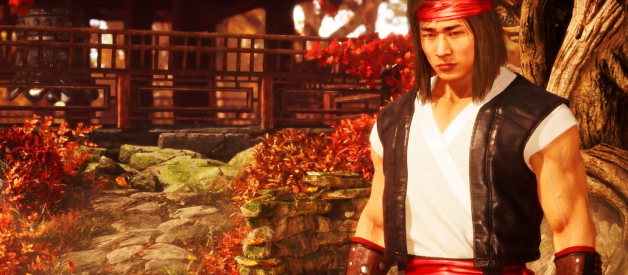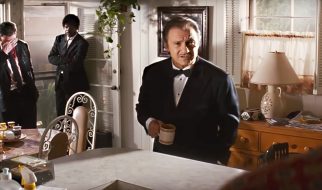Liu Kang, missing in action since 2002, returns to the forefront of Mortal Kombat in his first franchise altering story since the 90s
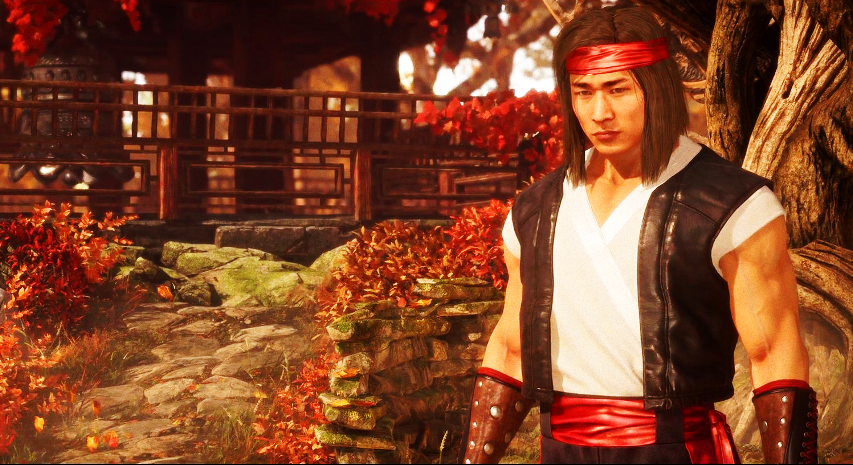 Liu Kang (modeled after Youngtaxlee, and voiced by Michael Yang King) in ?Mortal Kombat 11? is the most realized the character has been since the 1995 film. | NetherRealm Studios.
Liu Kang (modeled after Youngtaxlee, and voiced by Michael Yang King) in ?Mortal Kombat 11? is the most realized the character has been since the 1995 film. | NetherRealm Studios.
As I?ve written these opinion pieces on Mortal Kombat, I?ve also slowly learned and re-learned things about the franchise I was otherwise disinterested in or didn?t know about because I was not a super fan who desired to know all there was to offer about Mortal Kombat. To some degree, I still view it as something my big brother loved, and so, not necessarily something I can ever become completely attached to. It becomes less of a nostalgic piece the more I learn about it in the present.
One particular aspect of the series I?ve otherwise ignored is John Tobias, a person many people deify or demonize. I know roughly a fair bit about Ed Boon?s particular involvement in the series from osmosis, but from an outside perspective of happening across conversations on forums, Tobias was an unknown to me. That he?s credited secondary to Boon always made me think he wasn?t behind the idea so as he helped. Sometimes the way these two men are discussed online frames Ed Boon as something of corporate greedy-man (akin to the classic music manager) who reaped the benefits of a lower management employee?s ideas, while Tobias (said employee) was the unsuspecting victim of said greed and exiled shortly thereafter.
None of that is the case, and this positioning always made me wary of plunging into the production history of the series. From what I learned about trying to suss out the messier aspects of Power Rangers? less-than-stellar production history, a lot of what you may read is hearsay, outright fabrication, or miscommunication of facts from tinfoil hat fanbase members. Unless it?s from the horse?s mouth (or someone close to said horse), you?ll never really know what happened because of professional respect for co-workers, or fear of being blackballed tends to keep things in the dark. Effectively, it?s none of our business.
A lot of what went into what made Mortal Kombat as we know it was a cooperative effort of a small team that mutated throughout its twenty-seven-year history. But its foundation, more or less, was the brainchild of John Tobias, whose preoccupation with an old arcade game ? Karate Champ ? and martial arts films pushed him to pitch an idea for a game about ninjas. At the time Tobias was a new employee of Midway Games.
Said idea was summarily rejected by his boss, Ed Boon, and other members of Midway Games? upper management. The idea was not revisited again until the proposed game meant to promote Jean-Claude Van Damme never saw the light of day. A fellow teammate (Richard DiVizio) encouraged Tobias to revisit his idea. The ?Van Damme Situation? facilitated Tobias and Boon?s drive to see his idea through. Tobias? weab-levels of love for bootlegged martial arts films on VHS (recorded in SLP mode), mythology (Chinese, Japanese, South Asian, etc.), Tsui Hark, Big Trouble in Little China, Enter the Dragon (Tobias argues its influence that isn?t all that pronounced beyond aesthetic), and the failed Van Damme project, led to the creation of the game that debuted in arcades in 1992.
Tobias was, more or less, the chief character designer and scenario writer for the first four numbered Mortal Kombat games, Mythologies, and (I think) Special Forces, before writing duties fell to John Vogel. I?ve been upfront about the fact that I don?t think Mortal Kombat is a well-written story, but, the level of relative consistency that the first four games show is surprising the more I look into them, so excuse me while I trip over the bar on the floor.
That competency is not present in the slip-n-slide mess later iterations are infamous for. For whatever discrepancies that lay in the Arcade Era (Kung Lao and Johnny Cage suddenly being not-dead, Bi-Han?s reasons for being at the tournament, the tournament?s rules, Raiden?s 180 personality flip), its follow-through with its plot threads kinda makes me reticent toward its blemishes.
What started out as a proposal for a game about ninjas (an element that remained, and unequivocally became the mascot of the franchise), expanded into an idea about the reclamation of a stolen tournament, the fate of the world, and how a ?multinational? cast of fighters fit into the defeat (or aid) of supernatural forces hellbent on conquering the Earth.
And nothing brought that concept together like Tobias? chosen protagonist, a traditional martial arts hero and heart of the franchise: Liu Kang. A Shaolin Monk with a character arc that saw him slowly building up to a more narrative-driven role that got expunged following the departure of his creator, John Tobias, from Midway Games.
So, let?s talk about what happened to Liu Kang.
The wuxia Hero, Liu Kang
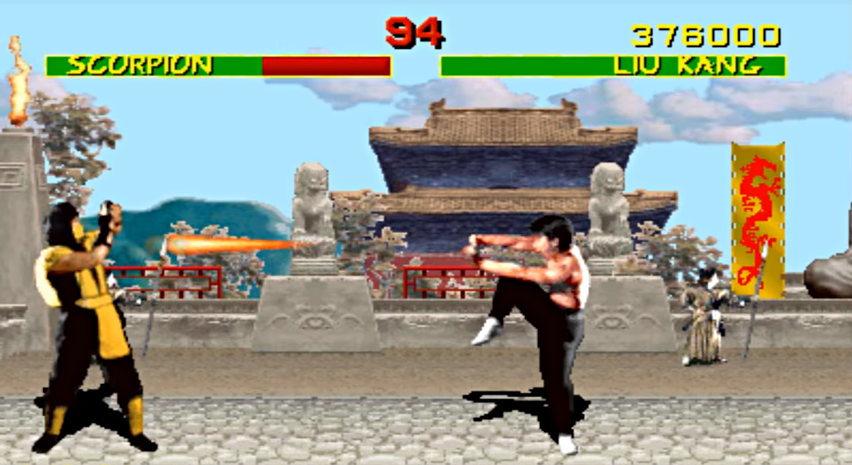 Scorpion (mascot) vs. Liu Kang (protagonist) in ?Mortal Kombat? (1992) | Midway Games.
Scorpion (mascot) vs. Liu Kang (protagonist) in ?Mortal Kombat? (1992) | Midway Games.
1992?s Mortal Kombat and 1993?s Mortal Kombat II is the closest the series has ever got to being a modernized ? Americanized (by consequence) ? take on the traditional wuxia story. Tobias? aforementioned admiration for Tsui Hark, a formative director of several wuxia films, including Zu Warriors from the Magic Mountain (1983), really shines through in the first three games as a formative influence, particularly within its environment design in Earthrealm and Outworld.
The similarities are largely surface details: There?s the heroic Shaolin Monks (Kung Lao, Liu Kang) as the figureheads of the story, there?s their foil in the corrupted sorcerer (Shang Tsung), there?s a warlord archetype that looms over the plot as a passive threat (Shao Kahn) but remains shadowed at first. There are more assassins than you count (Kitana, Sub-Zero), bandits (Kano, Baraka), soldiers beholden to patriotism (Jax, Sonya), and an immortal martial arts expert (Raiden) who also is a god. The strength of the hero and his supporting cast need no explanation. Their superhuman and supernatural powers are a literal manifestation of their life-force (their Chi/Ki), all of which fluxes in accordance to the severity of their circumstances and how well they hone their skill.
Think Dragon Ball and Dragon Ball Z, another modernized wuxia tale (Journey to the West), where power levels are explicitly personified as a fighter?s ki, and the strength of their ki is reliant on their bettering themselves. That the later games try to rationalize away so much of MK?s ?power from within? fantasy is disappointing. It created more problems than resolutions and is responsible for every other discussion about MK being a complaint about power levels.
Liu Kang?s Bruce Lee-isms in the Arcade Era is more aesthetic than it is personification (and his actor, Ho Sung Pak, didn?t want to cut his hair, so we weren?t getting a bald Shaolin Monk ever). As our protagonist, the only character closest in attitude to the traditional wuxia hero, Liu Kang is driven by the desire to better himself as a fighter and seeks retribution for wrongs committed by evil. Shang Tsung and Shao Kahn as the representatives of imperialistic and supernatural evil are probably as close as it gets to paralleling institutionalized and corrupt power structures of an ancient (or modern) fantasy China in a wuxia story.
Liu Kang?s role in MK1 and MK2 are oddly split: MK1 is all about justice, MK2 retribution. Everything about Liu Kang?s presentation in the first game is stark: From the aggression of his win poses, fighting style, and appearance. His mini-biography focuses more on his role in the plot than anything that might personify him. The most we get to know about him is that he?s ?strong in his beliefs? (um, violent-non-violence?) and that he ?despises Shang Tsung? (mans is evil). Piecing together the equally sparse story details over particular character bios (Shang and Liu?s) and opening scroll, reveals why, but MK1 Liu Kang is not an entirely defined character.
MK2 is where the wrinkles are introduced. Liu Kang?s role in the plot is personified by a personal vendetta. The Shaolin Temple (or Wu Shi Academy) is burnt to the ground, its occupants brutally murdered. He meets with his nomadic friend, Kung Lao, and the two are united in a mission of avenging what is effectively their family.
Additionally, he allies with the assassin Kitana (a newcomer in MK2), the ?daughter? of Shao Kahn who defects to Earthrealm and feeds him valuable information (this is never made explicit in either of their bios, unfortunately). Though he is required to (perpetually) defend his title and protect Earthrealm from Shang Tsung and Outworld, revenge makes the lack of agency Liu has in that circumstance irrelevant. MK2 Liu Kang?s entire mission is the classic martial hero seeking revenge, following his own moral code.
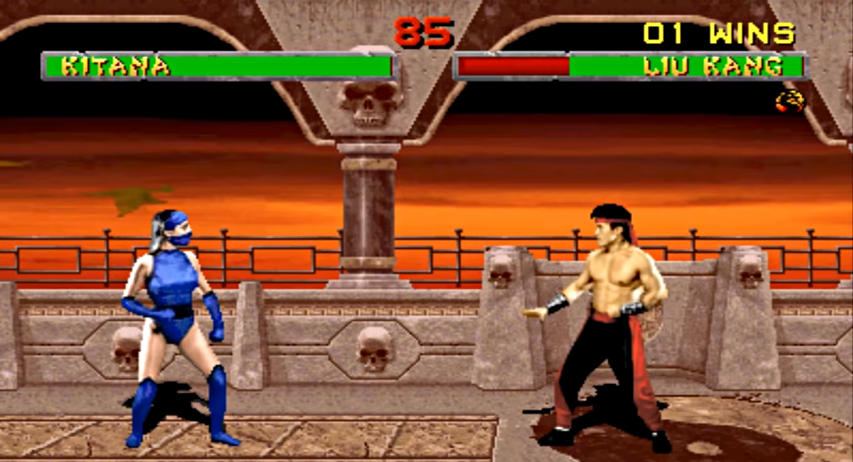 Princess Kitana vs. Liu Kang in ?Mortal Kombat II? (1993) | Midway Games.
Princess Kitana vs. Liu Kang in ?Mortal Kombat II? (1993) | Midway Games.
Liu Kang comes to us as a fairly complete character at the start of Mortal Kombat?s first trilogy. What one can infer from his ?arc? (as it were) is effectively not one of a man destined, or chosen to defeat the forces of evil or someone who needs to learn a lesson. He is a disciplined fighter marshaling his strength and becoming the defender of Earthrealm. Raiden?s involvement in his narrative is zilch, so his protecting Earthrealm and reclaiming the Shaolin Tournament are his own choices, but ones that carry a calculated risk.
The canon prequel comic books for the first two games, published by Midway (not Malibu comics), do a great deal to humanize Liu Kang. MK2?s comic, in particular, establishes that Lao (a member of the White Lotus Society) refused the tournament invitation because he realized that his participation would endanger the Shaolin Temple and her residents. Despite the potential benefit of saving all of Earthrealm, Lao wouldn?t break his vow of non-violence and invite the retribution of Outworld on his people.
In the MK1 comic, Liu, despite also being a non-violent Shaolin himself, accepts the invitation to take part in the tournament, knowing Shang Tsung?s intentions are for ill and will affect everyone, not just the Shaolin. His choice requires that he leave the White Lotus Society and kind?ve go against his beliefs. Still, the MK2 comic shows that Liu accepts the consequences that come with his participation and eventual victory. It doesn?t lessen the obvious pain he experiences when he returns home and finds everyone (except Lao) dead by the hand of Shang Tsung and Shao Kahn?s goons.
MK1 Liu Kang is a fairly thin character whose only preoccupation is his duty to the Shaolin (reclaiming their tournament from Shang Tsung) and Earthrealm. MK2 Liu Kang is ?fleshed out? in the sense that the motivation of avenging the Shaolin alongside his friend makes it more about him and not his duty. The additional connections to Kitana and Lao make it so he doesn?t stand alone among the cast. He?s connected to someone. (The comics do establish that he becomes friends with Johnny Cage and Sonya Blade as well.)
The first part of his split arc begins with something to protect and reclaim, and ends with avenging the very people who motivated him to step into the line of fire to begin with. Liu as the enemy of Shao Kahn and Shang Tsung is a clear personification of his role in the classic ?good vs. evil? story, which, when it comes down to it, is what Mortal Kombat is. A story of ?good vs. evil?.
Liu achieves his victories with his skill and the strength of his will. Y?know, like any comic book character or wuxia hero. This is the major reason he can defeat Prince Goro, Shang Tsung, and the immortal Shao Kahn despite their varying degrees of strength outclassing him. That, and their lack of principal. Liu?s role as the immortal champion of the tournament is circumstantial, but entirely a destiny of his own making.
Liu Kang, the Mentor and the ?Chosen One?
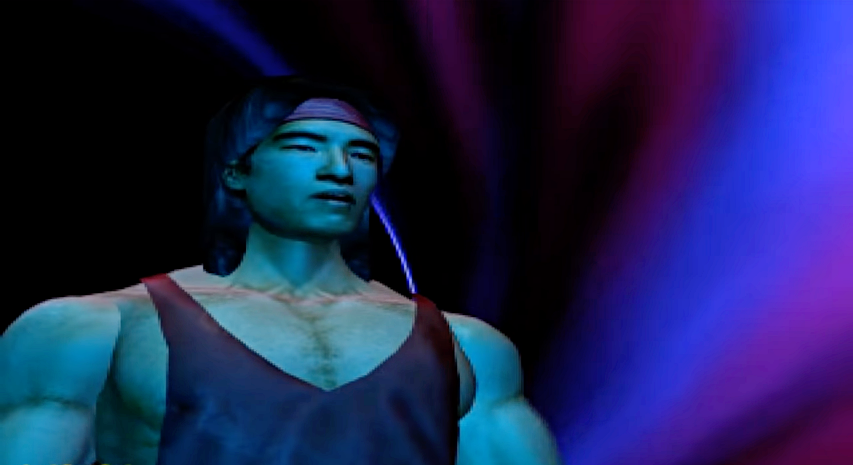 A dumbfounded Liu Kang speaking to Kitana in ?Mortal Kombat 4″ (1997) | Midway Games.
A dumbfounded Liu Kang speaking to Kitana in ?Mortal Kombat 4″ (1997) | Midway Games.
1995?s Mortal Kombat 3 and 1997?s Mortal Kombat 4 see a shift away from the heavier wuxia influences present MK1 and MK2 and turn in more toward traditional western fantasy and science fiction. The influence isn?t gone, but it is less pronounced beyond the obvious Bride With White Hair stand-in with Sindel.
MK3 brings to a head the story thread that began in the first two games by bringing to the forefront Shao Kahn, the warlord archetype whose two-time loss to Liu, motivates him to use the body and soul of his dead wife-by-conquest (Sindel) to circumvent the rules of the tournament (meant to protect realms from brazen invasion), to invade Earth. (It?s never really explained how Sindel?s soul allows him to loophole through that, but it?s whatever.) Kahn also provides Shang Tsung?s somehow-not-dead-arse one more chance to prove his worth to him.
The next step of Liu?s arc sees both he and Lao take up the task of rebuilding the Shaolin Temple and reestablishing the White Lotus Society, an organization created by the Shaolin designed to recruit defenders for Earthrealm.
The unfortunate implications that the Shaolin were wiped out, frames Liu and Lao as ?the last of the old guard?. But if the MK4 prequel comic is anything to go by, some of them, namely Liu?s grandfather, got out of that situation alive. That MK3 came with no prequel comic to establish the greater story beats is something of a missed opportunity.
Effectively, the two characters have become mentor figures to ?the next generation? of sorts, but, for Liu, that wouldn?t really happen explicitly until the fourth game. Instead, Shao Kahn?s schemes see their otherwise slow recovery put on hiatus when the immortal targets everyone who participated in the Outworld tournament (and prior) in a move to remove his opposition. Liu is at the top of the list of people he wants to see dead.
MK3 makes the conflict for Liu more personal. He not only has to worry about keeping himself alive, but the barely renewed Shaolin sect, and Earthrealm. Kahn practically gets his way for most of the game, his attempt to merge the realms happening over time through the corrosion of the environment. And in the end, Liu?s quest to save Earthrealm from Kahn leaves him without his friend. Lao attacks Kahn, fighting him one-on-one, and he?s killed. Liu loses his head and goes Super Saiyan on Shao Kahn. Yet for all the thrashing Shao and Shang Tsung endure under Liu, he doesn?t kill them. He only does enough to make them think twice about fucking with Earthrealm. They escape with their lives yet again.
Going into MK4, Liu is essentially alone in his reconstruction of the Shaolin Temple. The final act of his second arc sees him become a master and the leader of the White Lotus Society without Lao until Lao is forced out of his secret life of peace to fight Shinnok and co. with the rest of them. (Kung Lao, you heel.) The prequel comic for MK4 (a story Tobias penned, but not scripted, or illustrated), establishes that Liu has begun to mentor a man named Kai, a recent member of the WLS. On a more personal level, things just get worse for Liu. Shinnok (a fallen elder god) attacks Edenia, the home of Kitana, and Earthrealm is threatened (again) by proxy of Shinnok?s aim to destroy the heavens to get back at his fellow elder gods for imprisoning him in the Netherrealm.
Liu has only gotten stronger as a fighter, and on top of his tournament-won immortality, the sorcerer Quan Chi and Shinnok?s tarnished god status is no match for Liu?s power. At this point, Liu is the Son Goku of his universe. Yet, for all his strength, he believes he failed in his mission to help Edenia and Kitana. He only ever knows the realm and Kitana are safe when she appears from a portal to thank him, regardless of his perceived failure, and offer her hand in marriage. She asks him to become the King of Edenia.
So, now?s probably a good time to talk about movieverse Liu Kang. (I fully acknowledge that I?m probably wrong about the following, but this is how the information is presenting itself to me.)
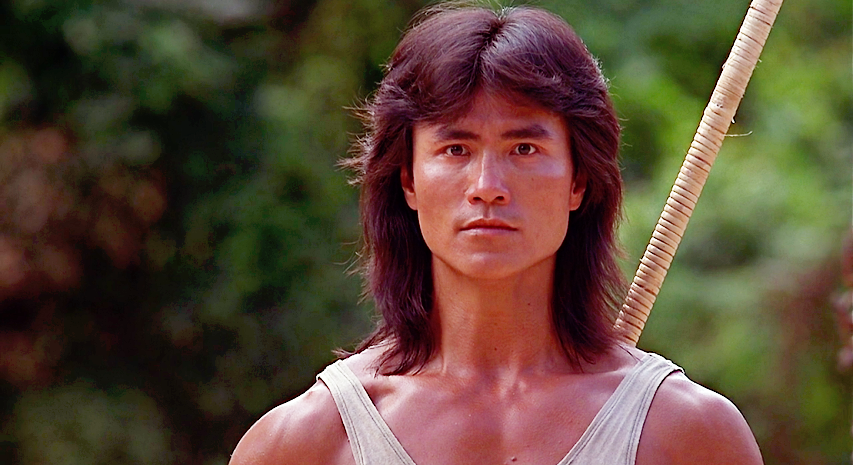 Liu Kang (Robin Shou) on Shang Tsung?s Island in ?Mortal Kombat? (1995). | New Line Cinema.
Liu Kang (Robin Shou) on Shang Tsung?s Island in ?Mortal Kombat? (1995). | New Line Cinema.
In 1995, four months after the release of MK3 in April, Paul W.S. Anderson?s film adaptation of the first two Mortal Kombat games released in theaters.
In the film, Liu is a wayward Shaolin Monk who lost his faith and moved to America, afraid of being solely responsible for saving the world. It?s in the screenplay written by Kevin Droney that we see the introduction of Raiden being instrumental in Liu?s role as the mortal hero chosen to represent Earth at the [Mortal Kombat] tournament. I also think this is the first time Raiden is even named the ?Protector of the Realm of Earth?. Before the film?s release, he was just an aggressive elemental god who shows up for the Shaolin Tournament, with no connection or interest in Liu.
It also introduces the idea of Liu being preordained to win against the forces of evil (represented chiefly by Shang Tsung in the film). It?s not a choice he makes (like he does in the games). The title of the ?Chosen One? and the reputation of the hero destined to save the world ah-la Buffy Summers (Buffy the Vampire Slayer) is set upon him by the Powers that Be. The script doesn?t incorporate it into his narrative, but movieverse Liu Kang is someone who had parts of his life mapped out for him and he eventually rejected it.
Shang Tsung?s actions in Liu?s prophetic dream seem like an outright refusal of his attempt to ?seize his own destiny?. By murdering his brother, he draws him back into that ordained life. If only in a gambit to steal one of the strongest souls around. The consequence of losing his little brother, Chan Kang, is one he takes to heart, to the point of disabling himself from taking real action. Raiden is repeatedly trying to dissuade him from brash action, telling him he is not responsible for Chan?s death, which was a consequence of Chan and the Order of Light?s choices. Liu Kang wants to kill Shang Tsung, but he?s also afraid of facing him.
For all the adoration I have for Tobias? Liu Kang, Kevin Droney?s Liu Kang, to me, is the definitive characterization. Anderson has gone on record saying he wanted Liu to be a ?really engaging character?, and I think Droney and Robin Shou succeeded making him that. So, I?ve always wondered why (with some frustration) none of his personality ever migrated to his game counterpart. (Sony and Johnny, at this point, are more like Linden Ashby and Brigitte Wilson?s take on the characters than not).
Droney?s Liu is a dynamic character, one who changes over the course of the film. His excuses for not taking up the mantle of Raiden?s chosen hero become less pronounced, and his guilt over Chan?s death becomes something he can pull himself out from under. He?s not a wuxia hero (they more or less create their destinies and roll with it), but more of a traditional hero in the sense that he needs to set aside his fears and get out of his own way.
Anderson?s film is oft credited for establishing the ?romance? between Liu and Kitana. Their relationship in the film (and its sequel) is rife with unresolved sexual tension. But, the ?Liutana? dynamic has been a story element that was planned for the characters since they were mere concept sketches on Tobias? notepad, and Kitana was originally named Kitsune, the daughter of Shang Lao (Shang Tsung). And like the game franchise, the film intended to make good on the romantic element (the novelization and the draft script has them come together in two different ways), but never found a way to work it in organically, so it got cut.
By 1997, the Mortal Kombat sequel, Annihilation, and MK4 take the relationship in different directions. Annihilation at the very least sees Kitana acting on her feelings toward a dumbfounded Liu Kang (who is relatively unbothered by her being 10,000 years old), but MK4 attempts to bring to a head a relationship that never even got the start the films provided, likely capitalizing on what they barely did. His rejection of her hand in marriage leaves their relationship in limbo. Liu is alone on Earthrealm with his duty to the Shaolin, and Kai. Kitana sees to the safeguard of her people.
The consequence of the 1995 film saw the games attempt to retrofit elements of its story into its universe. Liu Kang has been retconned as the ?Chosen One?, Raiden has officially become his mentor (and friend). The Great Kung Lao is now his ancestor (according to Goro?s MK4 biography), and the Kitana and Liu Kang flirtation is more visible than invisible.
With the way MK4 ends, it?s clear that more was in store for Liu Kang?s character in later installments of the game.
Then came the burnout, the departure, and the five year hiatus.
The figurative and literal death of Liu Kang
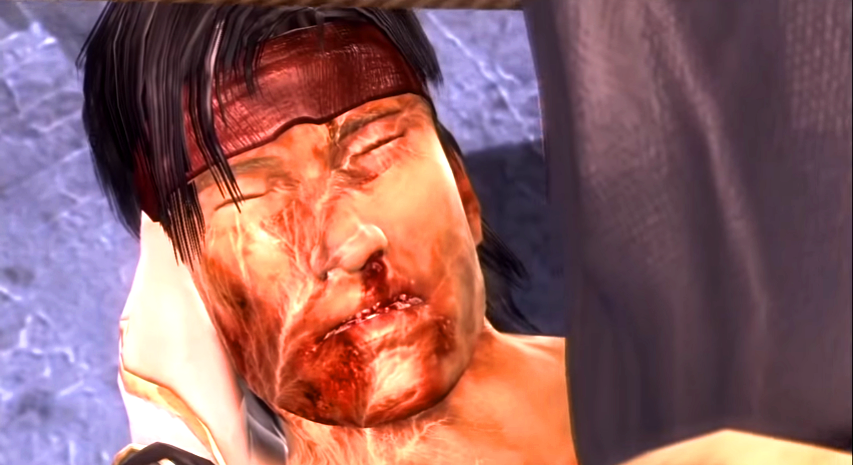 In which ?Mortal Kombat? (2011) kills their main character off? again. | NetherRealm Studios.
In which ?Mortal Kombat? (2011) kills their main character off? again. | NetherRealm Studios.
Liu Kang as Mortal Kombat?s series protagonist had a fairly foreseeable beginning and end, and by that extension, I guess, so did the franchise. Mortal Kombat 3 and Mortal Kombat 4 established a fairly solid foundation for his continuation within the series. Liu and Lao were masters. They had reached the plateau of legendary martial artists most wuxia films immortalize in gossip or oral stories.
At this point, Acclaim and Midway Games were milking the Mortal Kombat IP for all its worth (largely in re-releases), with almost little breathing room to acclimate their rapid-fire releases. Whether that?s a consequence of atypical publisher edict, or not knowing when to fold and leave the table remains to be seen. With the approaching demise of the arcade scene and the console home market evolving to the next stage, Acclaim still tried to cater to both markets.
So, naturally, something had to break, and unfortunately, it was the developers. In 1999, John Tobias and several other members of Acclaim departed from the studio during the development of Mortal Kombat: Special Forces (a spin-off game oft regarded as one of the worst games in the series), largely on account of creative burnout (or that?s the impression he gave). He felt it was time to leave. The production issues with Mortal Kombat 5 (originally aiming for a projected 2000 release) resulted in a hiatus that would not see an end until 2002 (the year I got into MK2). But, the consequence of Tobias? departure meant Liu Kang was stuck in the middle of the ocean without a sail to guide him.
The natural assumption to make about 2002?s Mortal Kombat: Deadly Alliance, if you weren?t already accustomed to the series? inconsistency at this point, is that the game would follow-through with what was set up with MK3 and MK4. The cliffhanger ending with Liu and Kitana?s relationship (it wasn?t just going to end with the rejection of marriage, right?), Liu and Lao?s positions at the Shaolin Temple, Liu and Kai?s dynamic as mentor and teacher.
Instead, in a move that assumes Liu Kang?s protagonist status was symptomatic of ?franchise fatigue?, the remaining production team at Acclaim discard a lot of what MK3 and MK4 set up, and have the duo of Shang Tsung and Quan Chi murder Liu in the opening cinematic. A gambit for shock value that worked for the audience. In a few moments, the foundation for Liu?s development outside the Arcade Era is washed away for what would be seven years of aimless creative choices. Creative choices that made it clear that Mortal Kombat was the only IP Midway was still making real money off of.
The writing, story editing, and directing duties of the franchise were handled by John Vogel. Vogel was the primary writer for Deadly Alliance, and Deception. He directed for Armageddon, whose story was written by Alexander Barrentine, and Brian Chard. Vogel also served as an additional story editor for 2005’s Mortal Kombat: Shaolin Monks, written by James Krueger. He remained the chief writer for Mortal Kombat vs. the DC Universe in 2008, the 2011 Mortal Kombat reboot, Injustice: Gods Among Us in 2013, and Mortal Kombat X in 2015.
For the most part, John Tobias has been open about the fact that if he had stayed on at Midway (and by that token, did not experience creative burnout), then the later Mortal Kombat games would?ve been far different. That?s a given. We definitely would?ve seen Liu Kang remain the series protagonist. He intended for the franchise to continue Liu?s narrative arc with the introduction of a legacy character: His son. A son I?m assuming would?ve resulted from his relationship with Kitana. In description, it definitely sounds cool, but with how some of MK4 turned out in execution, you never really know.
In that context, it feels as though Liu was meant to become another Great Kung Lao or Raiden figure. His son (the legacy character) may have taken his place as the new hero of Earthrealm if it wasn?t going to be Kai (another character they did dirty). But, I?m speculating. That Liu Kang?s story was derailed so drastically is depressing in retrospect. I don?t think anyone at Acclaim was in Liu Kang?s corner after Tobias?s departure.
I feel Tobias was definitely the one steering his ship in the games, so far as the stories went. Liu didn?t have the fortune of Street Fighter?s Ryu, who, despite some hiccups, had fairly solid support from Capcom who stuck with the character through thick and thin. That?s what makes Ed Boon explicitly say ?Liu Kang is the main character of Mortal Kombat? weird. They didn?t treat him like it.
For the better part seventeen years (since Deadly Alliance), Liu Kang has been put through the wringer of some particularly bad story beats. Zombie Liu Kang, Revenant Liu Kang, Assassin Liu Kang, all feel as though the developers worked off the presumption that Liu Kang?s overly noble standing and personality was one of the underlying issues with his character outside of ?franchise fatigue?. Consequently, it gave birth to the reductive ?Liu Kang always wins?, and ?Liu Kang is boring! There?s no threat with him around!? arguments. He was essentially a victim of the godforsaken, ?what if we ?deconstructed? our noble hero with a dark turn?? shtick that still plagues a lot of media to this day. It?s less pronounced now, but there?s over a decade?s worth of damage done to a lot of great heroic characters in hindsight.
Liu was all but unceremoniously tossed to the side as a ghost to usher in a new antagonist (Onaga) and protagonist (Shujinko). He spends the tail end of the original continuity as a spirit (Deception) with no proactive role in the game outside of rescuing most of the cast from Onaga?s thrall (something they already had Ermac for), while his corpse is reanimated into a zombie by Dark Raiden (just? why?). In Armageddon, his role doesn?t extend beyond the opening cinematic and the story sees that Liu Kang?s spirit moves on to the afterlife when his zombified corpse is killed alongside Nightwolf (his anchor to the living world). Armageddon is the last connective game of the original continuity. (MK vs. the DC, and Shaolin Monks are the ?bottle episodes? of the franchise.)
With the 3D era, Acclaim created a series of consequences they couldn?t write themselves out of and they ultimately solved it by killing the entire timeline (creative). But this isn?t surprising. Every time Dark Raiden shows up in a storyline, the narrative ultimately stalls. When Liu Kang dies or becomes an edgelord, the story hits an even deader end. Mortal Kombat was in such a state that, the deluge of bad ideas and roster fat in the form of forgettable characters and conflicts, ultimately forced the series into an overly compressed reboot in 2011.
Yet, the franchise?s 2011 reboot (Mortal Kombat 9) isn?t a boon for Liu Kang so much as it is just another low point for the character. Similar to Kitana, a lot of things happen around and to Liu Kang, but he is seldom the initiator of the conflict or circumstances. MK9 is a messy, stitched together retelling of original three games that becomes a bullet-points version of the aforementioned stories instead of a decent re-imagining of their events. Important narrative beats that should happen on-screen happen offscreen, plot points that made sense in the original game are condensed into something that gets hurried along so the next nostalgic slideshow in the game can occur. Think a basket of clothes smashed into a tiny suitcase.
What began as the journey of Liu Kang was retold with him as a supporting-to-minor character. Raiden, Sonya Blade, and Johnny Cage were the de-facto point of view characters, with Sonya and Johnny replacing Kitana and Liu Kang?s romantic story beats retrofitted to suit their characters. Liu Kang is whittled down to nothing in terms of screen presence. His personality is largely a consequence of his performer, Tom Choi (the cool dad from Teen Wolf), a character actor who makes very little work very well.
He has moments, but they aren?t enough to compensate for the fact that his presence almost has little to no impact on the plot. In his absence, nothing would change about the trajectory of the story, as everything is effectively built around and supports Raiden. And by the climax, the story has been compromised by so many narrative cheats, that Liu Kang?s justifiable anger toward Raiden?s actions that lead to the deaths of his friends, and allowing Shao Kahn to enter Earthrealm (on the hope the elder gods might act, not the certainty), barely registers.
When Raiden kills him, Liu Kang joins the rest of the cast as zombified cannon fodder and it?s hard not to question what convinced the writers (and the upper-management that signs off on the scripts) that this was a good idea for all parties involved. Mass killing your characters remains one of the laziest narrative decisions you can pull in a story where it?s neither warranted nor earned. It?s up there with killing your main character in a cinematic to shock your audience.
Liu spends most of Mortal Kombat X (2015) enslaved by Quan Chi and has no narrative agency as an undead zombie. He?s not particularly interesting, and because he?s a slave, none of his anger is genuine. It?s being puppeteered. As a result, there?s no gravity in the scene where Raiden apologizes profusely to his dead student and he?s rejected angrily by the wraith-like Liu Kang. It?s just padding that goes nowhere. Liu?s character is further diminished in versus intros, where he, in a ?what if? skin that depicts him as an old man, sees his character as overly arrogant and overly aggressive toward a lot of characters (Kung Lao especially, good lord.) When he is pitted against NetherRealm?s missing gay character, Kung Jin (Lao?s cousin-turned-nephew), he sneers in doublespeak at the idea of a gay thief turned Shaolin. This particular characterization is baffling. Liu Kang, the guy who can forgive the transgressions of an assassin, multiple assassins even, can?t vibe with a gay thief? I know versus intros aren?t canon, but I legitimately do not understand how they thought this characterization was good.
A lot of the aforementioned story beats were not done in service to Liu?s development, let alone his otherwise incomplete arc from the original continuity. Even from an observer?s perspective, the creative choices made for the character were like watching the slow and steady decay of a fairly solid and uncomplicated personality. Much like Kitana, the impression that Liu was being handled by individuals who wanted nothing to do with him, as their series slowly lost relevance outside their core base, remains a hard impression to shake.
It?s not necessarily that the character was completely botched. Botched is Brain Tee?s role as Assassin Liu Kang in the Machinima series Mortal Kombat Legacy. Legacy is an embodiment of the mindset that writers have approached the character with on the pretense that he needs to be ?darker? to become a ?better character?. Assassin Liu Kang and Revenant Liu Kang are nothing if not obnoxious ideas that never work. I wish people would learn, ?dark? or ?evil? does not equal depth.
Like I said before, Liu Kang had his moments in MK9. The core of what makes Liu is present. There is some potential in the idea behind Liu losing faith in Raiden?s abilities as Earthrealm?s protector as he makes one poor decision after another. But, like Kitana, Liu wasn?t the focus of an otherwise patchwork plot. His frustrations don?t come into play until so late in the game that it sticks out like a rough story mechanic as opposed to genuine development.
Additionally, I don?t think anything will be more disappointing than transforming one of Liu Kang?s closest friends, Lao, into this insecure and jealous character that loathes or envies him, and needs to prove himself his equal in Shaolin Monks and MK9. A solid friendship between two characters was transformed into a barely discount Goku vs. Vegeta. Ugh.
I don?t think it?s a stretch to say that how Acclaim (and later NetherRealm Studios) handled Liu following the departure of John Tobias, damaged his standing as a character. Liu?s general irrelevance to the overall franchise since his demotion to a minor and supporting character in both continuities, is a sort?ve damage that cannot be undone on any level. Even Raiden?s standing as a character, because of the things done to Liu Kang and the other characters, has diminished him. ?Raiden Ruins Everything? is an actual meme that became Mortal Kombat 11?s driving narrative force. They did both characters dirty.
What happened with Liu boils down to, ?What?s the most shocking thing we can do with this character we?re not interested in using?? None of it contributed to the character?s evolution because the developers had no idea where they wanted to go with him or the series. Acclaim and NetherRealm have spent years trying to replace him as the protagonist, with nothing sticking until 2015?s MKX. Yet, making the Cage family (the white American military family) the protagonists in MKX was a decision I thought was made in bad taste for a franchise that started strong with a Chinese protagonist. (Raiden?s Asian-ness is erased proxy of whitewashing, Shujinko barely existed as a character to justify his protagonist status.)
It?s the equivalent to giving Big Trouble in Little China?s Wang Chi?s ?true protagonist? role to Jack Burton and stripping the latter of what is effectively a reflection of the ineffectual and culturally insensitive white American who runs on exceptionalism. To have your former non-white protagonist reduced to a mindless slave and later, the evil warlord of the Netherrealm is as bad as it gets.
But, Liu Kang?s undeath as the new ruler of the Netherrealm alongside Kitana was a direction they were sticking to as they navigated the future of the series with blindfolds on. At that point, consuming MK media Liu Kang appeared in was akin to reading X-Men comics written by people who loathed Scott Summers. (Everyone not named Joss Whedon and Chris Claremont, apparently.) One resigns themselves to expecting nothing decent and hoping things don?t get worse from there.
Then Mortal Kombat 11 (2019) does something I wasn?t expecting, and it was the decider in whether I would walk away from the game with a positive or negative impression.
It not only resurrected the heroic persona of Liu Kang (from his MK1-MK4 stint), but it tried to do something with the Revenant subplot from MK9 and MKX so that it worked to the advantage of MK11?s time travel preoccupied storyline. Before now it was just cheap, schlocky shock value used to clear up roster space for new characters (something you should never do when trying to introduce new characters).
Getting Liu Kang Back on Track
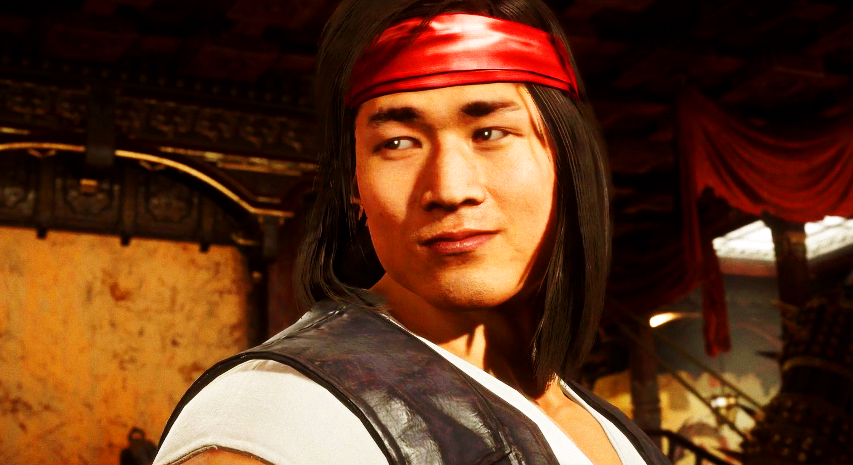 Liu Kang lacks the common sense not to jump through swinging blades, but he makes it look cool. | NetherRealm Studios.
Liu Kang lacks the common sense not to jump through swinging blades, but he makes it look cool. | NetherRealm Studios.
MK11 follows the story of the classic MK2-MK3 roster, now a time-displaced group of fighters stuck in the middle of precursor god?s gambit to rid the universe of Raiden to secure the future of her Elder God children, Cetrion and Shinnok. Liu, one of several fighters seemingly yanked out of the Arcade Era of Mortal Kombat?s timeline, attempts to figure out how to mend the fabric of time, all while fighting an undead version of himself.
The younger iteration of Liu tries to avoid the seemingly unavoidable fact that he was not only killed by his mentor but that his soul would be corrupted and he?d become ruler of the Netherrealm alongside his best friend (Lao) and would-be sweetheart (Kitana). Every time someone tries to address it, Liu Kang actively dismisses the conversation, choosing to focus on the crisis at hand. He doesn?t want to think about it, doesn?t want it to be true.
He doesn?t reckon with the potential truth until Raiden appears to go off the deep end and attacks Past Scorpion with Shinnok?s amulet (the reason Dark Raiden persisted into the future). He finds himself forced to defend an enemy (if only to confirm that his reasons for defecting from Kronika are true).
MK11 feels like the first time in twenty-two years, since 1997?s MK4, someone seemed to care about how the character was handled. Shawn Kittelsen (writer for the MKX prequel comic, narrative lead of Injustice 2) and Dominic Cianciolo (a co-writer for MK9, Injustice Gods Among Us, and MKX), the primary story writers of Injustice 2 (2017), seemed able to bring Liu Kang out from under his less-than-stellar storyline and characterization in the previous two games (chiefly written by Vogel, and co-writers Brian Chard, and Jon Greenberg). His role in MK11 is considerably larger and several degrees stronger than anything he was given in MK9 or MKX. And for a time, Liu?s role in the game is that of a supporting character.
With fourteen characters to compensate for across twelve chapters, Liu, Kitana, and Lao disappear from a fair chunk of the story. Yet none of that ever feels like a case of the writers wanting to do anything except acknowledge their existence or play favorites. (The Cage family have fairly minimized roles in MK11 compared to MKX.)
One of the best things about Liu in MK11 is the effort that goes into realizing him as a character. So much about his character is withheld until the second and third arcade games, the latter of which tells you about his relationship with the Shaolin Monks, and Lao. Before, his MK1 bio prioritized his role (?Shaolin Monk enters the tournament to save Earthrealm?) in the story versus what connected him to it. How much you could infer from the MK1-through-MK4?s textual declarations of Liu determined who he was as a character told in a blurb.
Just in terms of the past persona, the clarity in which Liu?s character shines is thanks to his performers Nick Toussaint (Blue Beetle?s stunt actor in Injustice 2) and Michael Yang King (Injustice 2?s Ryan Choi). Liu moves with all the self-assured control and confidence of a twentysomething fighter in his prime thanks to Toussaint, and King delivers this incredibly earnest performance as a level-headed fighter that tries to see all angles of his situation before making or passing judgment. MK11 Liu, above all else, is a team player. No ego rests in knowing his position as Raiden?s ?Chosen Champion?. He only sees it as a means to settle conflicts that threaten to destroy his home.
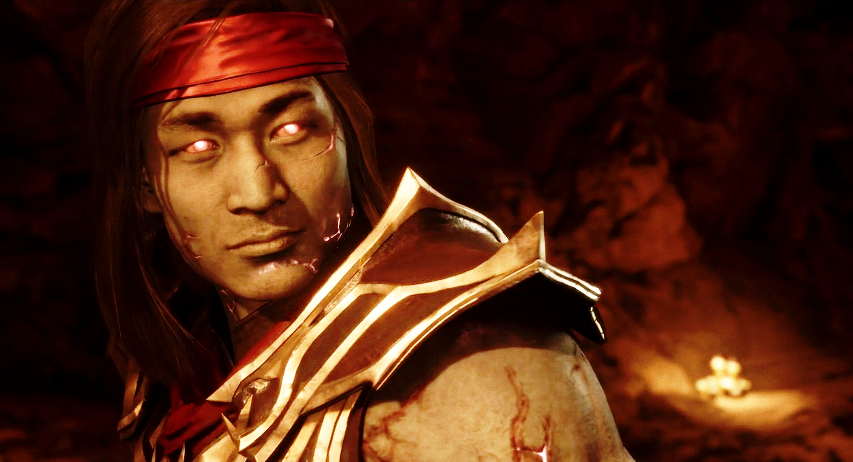 Emperor Liu Kang finally becomes a character on the hour of his death. A shame, but I won?t miss him. | NetherRealm Studios.
Emperor Liu Kang finally becomes a character on the hour of his death. A shame, but I won?t miss him. | NetherRealm Studios.
On the flip-side, King works with Lawrence Kern to give an entirely distinctive performance as the undead Liu Kang, who keeps all of his skill but lacks his past self?s mercy, compassion, and objective thinking. Revenant Liu Kang is a wholly aggressive and malicious character. His only concern is avenging his and his allies? deaths with the help of Kronika, who promises him a better life in her New Era. The voice King puts on (while clearly processed), in conjunction with Kern?s more aggressive body language, really made me believe another person entirely was at the wheel of the performance.
This is especially notable in the persona of Fire God Liu Kang, an amalgamation of Raiden, Past Liu Kang and undead Liu Kang. Created by Raiden in a gambit to save Liu Kang?s soul, the God of Thunder and Fire moves with Raiden?s certainty and commands the best aspects of Liu nobility at his maximum potential.
Past and Fire God Liu Kang?s earnestness is a star contrast to the utter self-interest of his corrupted self. King provides three distinct vocal performances which goes a long way in bolstering and characterize Liu in a way he never has been in the franchise. Much like Jade, he becomes a new character and for the better.
Past and Revenant Liu Kang work like foils, similar to something like the Prince and Dark Prince in Prince of Persia: The Two Thrones (2005). The Two Thrones exists solely to walk back the edgy characterization of the Prince in Warrior Within (2004). To bring him closer to his original personality in The Sands of Time (2003).
Revenant Liu Kang ? and by that extension, Dark Raiden ? are nothing if not a fallacy taken to its logical end: A dead end. Dark and edgy wasn?t something Liu needed so much as he needed writers who were invested in who he already was and could deliver on that front. Revenant Liu Kang works like a cautionary tale the younger version of himself is determined, if not confident, he won?t become. The vice versa loathes who he used to be.
The restructuring of the narrative path chosen in MK9 and MKX is pretty much why I love the story of this game. Following the revelation that Liu and Raiden were manipulated across multiple timelines to kill each other by Kronika (to prevent them from destroying her desired timeline), Liu is taken out of the direct narrative action of the climax.
He?s the damsel-in-distress everyone has to save. The affirmation that Liu?s survival is so important that the realms would be doomed without him is almost immediately snuffed when you have to watch Liu ?die? (so to speak) when his undead counterpart robs him of his soul.
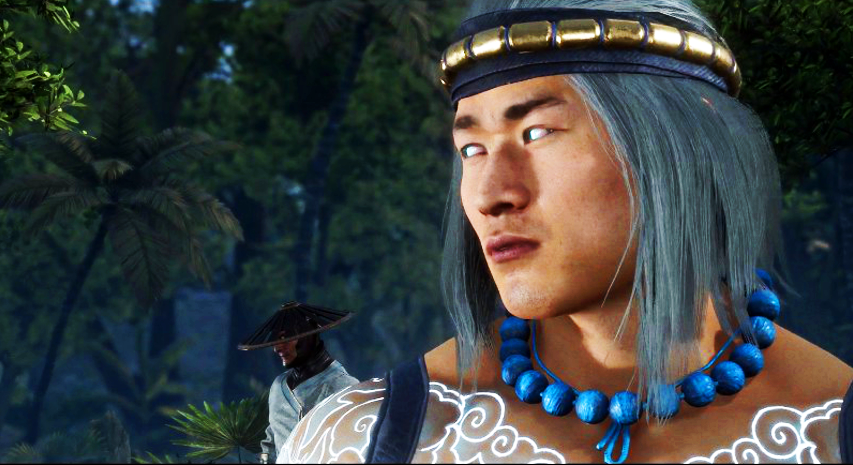 ?Mortal Kombat 11? (2019) saved my favorite characters from the dark damnation from which they were cursed. My heroes have returned. | NetherRealm Studios.
?Mortal Kombat 11? (2019) saved my favorite characters from the dark damnation from which they were cursed. My heroes have returned. | NetherRealm Studios.
The scene itself does two things: It establishes undead Liu Kang is beyond saving by conventional means. Raiden sees, without any doubt, the damage caused by what could?ve been him, orchestrated by the keeper of time. He sees what it will do to his champions, and he becomes hell-bent on breaking the cycle. In a lot of ways, Past Liu Kang?s faith in Raiden is validated when Raiden sacrifices himself to save his soul and grants Liu godhood. It?s not exactly the wuxia hero achieving immortality or godhood of his own accord, but the moment works to solidify the strength Raiden and Liu?s familial relationship. Or, at least the one they tried to write into their story.
Raiden yanks Kronika?s trump card out from under her and redeems himself. Liu saves the universe, restored as the narrative?s champion and newly ordained protector of Earthrealm as the God of Fire and Thunder.
It was surreal to engage in the last gasp of a story and have it completely and utterly focused on Liu?s actions and motivations. There was no switching between characters, no intermission to another part of the story. The last forty minutes of MK11 is pure, unadulterated Liu Kang heroism.
The whole gambit more or less blew my mind. I had accepted a while ago that Liu would be reduced to nothing (again), and die (again). I expected the Cage family would save the day (again), but the story hit that swerve hard.
So much about Liu Kang and Raiden?s narrative arc in MK11 is literally about working the franchise and these two characters out of the dead-end loop they created before MK9 and only reinforced with said game. Fire God Liu Kang?, the protector of Earthrealm and time itself, isn?t the story John Tobias intended. But, it is without a doubt the coolest outcome for Liu Kang in the here and now.
I still get chills thinking about it.
When all is Said and Done
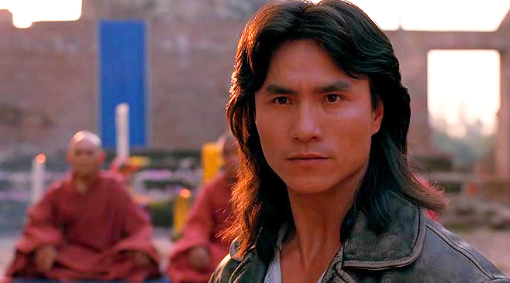 Liu Kang and his Godlike hair in ?Mortal Kombat? (1995). | New Line Cinema
Liu Kang and his Godlike hair in ?Mortal Kombat? (1995). | New Line Cinema
As all roads (for me) lead back to Paul W.S. Anderson?s Mortal Kombat, if anyone asked me why I liked or loved Liu Kang at all, it was because the film made him such a personable character. One who scoffed at the idea of Gods and Sorcerers? (at first), but didn?t take a lot of convincing when he was proven wrong. He?s the straight man whose entire arc is accepting that it?s his destiny to save the world. The added incentive to save his little brother?s soul from Shang Tsung only empowers him.
The Liu Kang of the mainstream Mortal Kombat series wasn?t a character in the same sense as his film counterpart. Film Liu Kang is a take ?em or leave him kind of character, but he is a fully realized character. Tobias? Liu Kang had all the ingredients to make him a fully realized character early on. The text blurbs of MK1-through-MK3 provide something, and MK4 pushes him forward, but he was never allowed to become a character like Robin Shou?s Liu Kang until MK11. It?s also only recently NetherRealm started putting in some kind of effort to make characters out of their cast, so the problem Liu Kang shared was roster-wide.
MK11 takes what I thought was a fairly simple character (who was subjected to some egregious ideas as the franchise rolled on), and created this solid portrayal of a hero and villain they did not capture once the series graduated from the arcades and 3D gaming into the ?modern era? of gaming.
There are elements of Liu Kang?s characterization that look and feel like they were influenced by the Robin Shou portrayal while forging a unique path. (Mans is lit. wearing his Annihilation shirt in MK11). The more overt Bruce Lee call-backs (the kiai?s, the nunchucks, the finger wag, and his body language), while almost as dated as Jackie Chan throwbacks, are the most explicit it?s ever been in the character?s presentation. It brings the rest of his persona together as this fiercely focused and disciplined fighter.
Liu Kang didn?t start out as my favorite character (that?s Sub-Zero and Raiden), but I never hated him either (I?m forever baffled by the ire this character gets). My like of the character was something that occurred gradually over time and intensified with the discontent regarding how he was handled. That MK11 unapologetically serviced up a narrative arc to reconcile the mess they created for him in the reboot and the original continuity, solidifies Liu as one of my favorite fighting game characters (of all time).
The idea that Liu as the centerpiece of MK?s ?story? was the problem of the series remains a baffling one. Especially when one considers the overall messiness of the franchise post-MK4. Its attempts to weave a greater narrative and world, were a consequence of less than stellar writing from the development team. Not the fictional character with no agency.
Knowing that there?s a whole generation of players who are probably only just getting introduced to him (or the franchise itself) with this game and will inevitably main him (be it for long term or a little while) is even more heartening. They?re getting the best version of Liu Kang.
I know better than to expect this solidity for Liu Kang to maintain in later iterations when Mortal Kombat comes back. I fully expect them to default back to dogging him for another seventeen years. But, right now, I?m content with what they gave him.
This story is part of a four part series focused on Mortal Kombat 11?s story mode.
